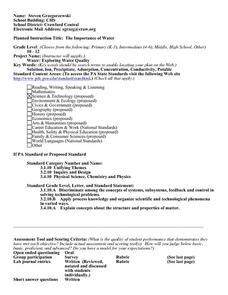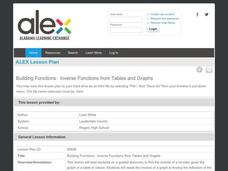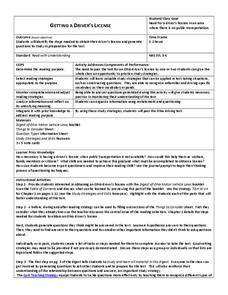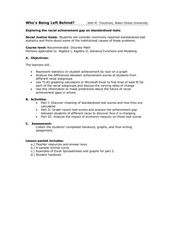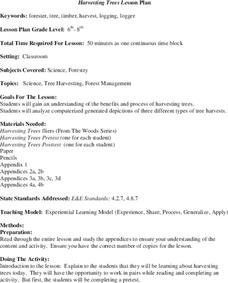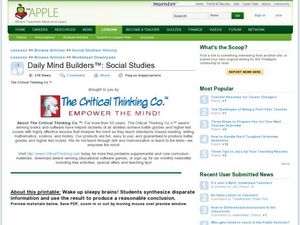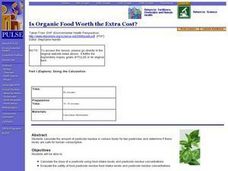Curated OER
Prototypes and Model Designs
Fifth graders examine prototypes and model designs. In this engineering lesson, 5th graders build a prototype out of a deck of cards and test their design. Upon completion, students write a letter to an architect which includes the...
Curated OER
Waterdrops
In this science worksheet, students learn about water resources and watersheds by reading and answering questions in this 8 pages newsletter. Students learn about salt vs. fresh water, discover the protective role of estuaries, learn...
Curated OER
Plotting Temperature and Altitude
students convert the temperature readings from degrees Celsius to degrees Fahrenheit. they predict and create a graph of what the graph of altitude (x-axis) versus temperature in degrees Fahrenheit (y-axis) might look like.
Curated OER
What's For Dinner?
Students share their own views on eating genetically altered foods. After reading an article, they research any issues concerning these types of foods in the United States. In groups, they create a campaign slogan to help gain funding...
Curated OER
Alphabet Soup Job Descriptions
Eleventh graders investigate New Deal programs. In this Great Depression lesson, 11th graders read the provided source materials that detail the agendas of 3 New Deal agencies. Students complete the provided analysis sheets and then...
Curated OER
Learning Empathy Through Art
Students create poems based on the Haiku form and research about WWII. Class discussion and classroom readings of student work finish this lesson. Emphasis is placed on Standards in the Arts.
Curated OER
The Importance of Water
Students explore the importance of water. They discuss why water is important and students design an experiment that evaluates the water quality and methods of improving water quality. Students perform testing and report their findings.
Curated OER
Water Quality
Students play the role of scientists testing for water quality in the area. In this ecology lesson, students determine the water sample's pH, temperature, dissolved oxygen and turbidity. They write a journal reflection after the activity.
Curated OER
Salinity
Learners define and discuss salinity, conduct classroom experiment to determine salinity of water sample by using hydrometer, record predictions, and demonstrate understanding of how salinity influences object's ability to float in water.
Curated OER
American Dream and The Great Gatsby
Is the American Dream alive and well or has it dried up and died? As part of a study of The Great Gatsby, class members search for articles on the state of the American Dream, analyze the arguments presented in those articles, and then...
Alabama Learning Exchange
Building Functions: Inverse Functions from Tables and Graphs
Is the inverse a function? Scholars learn how to examine a function to answer this question. Using an online interactive, they examine the properties of inverse functions to compare to the original function.
Curated OER
Getting a Driver's License
Students practice study strategies for the Ohio driver license test. In this driver's license lesson, students read the Vehicle Laws booklet and highlight important information. They create questions that might be on the test.
Curated OER
Native American Bartering
Fifth graders create items to barter. In this Native American bartering lesson, 5th graders read a book, design and make items, and barter with their peers. Students reflect on the experience through journal writing.
Curated OER
Olympics (Grade 4)
Young scholars research information about the current Olympic research. In this Olympic research lesson, students take a pre-test to determine their knowledge about the current Summer Olympics. They choose one of three areas to research...
Curated OER
Census and Gold Rush Town
Learners analyze data and form a mental picture of the make up of a gold rush town. They explain social life in a gold rush town. They use online sources to see paintings of camp life and read accounts of miners' lives.
Laboratory for Atmospheric and Space Physics
Space Travel Guide
Looking to take a trip? Why not go to space? Here, scholars take on the role as travel agent to create a guide to their favorite planet including travel tips and sightseeing recommendations.
Curated OER
Who is Being Left Behind?
Students investigate scores as they relate to race. In this algebra lesson plan, students analyze standardized scores and how race can affect these scores. They plot their findings on a graph and draw conclusions.
Curated OER
Language Arts: Two Specific Documents
Students are able to read and analyze the essential parts of two specific types of documents, the informed consent document and the position paper, used by scientists to communicate information about their research to two different kinds...
Curated OER
Harvesting Trees
Students examine and discuss benefits and process of harvesting trees, analyze, compare, and contrast computer-generated depictions of three different types of tree harvesting methods, read Harvesting Trees flier, and answer discussion...
Curated OER
Volcanoes: Shield or Composite?
In this volcano worksheet, students read a 1-paragraph selection regarding shield and composite volcanoes and then identify the 8 errors in the paragraph.
Curated OER
Daily Mind Builders: Social Studies
In this critical thinking worksheet, 5th graders create a conclusion. Students read a short passage and use the given information to synthesize their own conclusion from the presented material.
Curated OER
How Much of Each Nutrient Does Your Body Need, and How Can You Find Out What Is In Each Food?
Fifth graders practice reading food labels to find nutrients in foods. In this health lesson, 5th graders read food labels and discuss the recommended daily allowance of each nutrient. They compare this to the food pyramid and create a...
Curated OER
How's Your Horoscope?
Young scholars examine the concept of astrology. They compare their traits with those of standard astrological descriptions. They discuss their findings.
Curated OER
Is Organic Food Worth the Extra Cost?
Young scholars calculate the amount of pesticide residue in selected foods for two
pesticides and determine if these levels are safe. They read an article about a
research study looking for metabolites of these pesticides in children....








